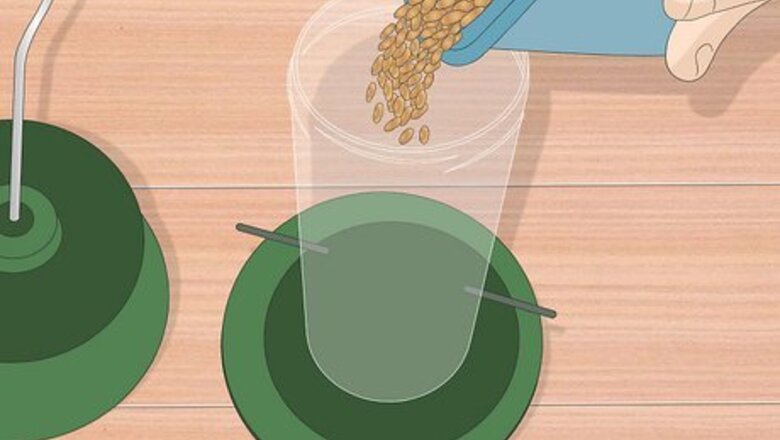
views
- Make your feeders less attractive to blackbirds by including only food that they don't like, such as safflower.
- Play recordings of blackbird alarm calls to disturb flocks roosting in your trees.
- Use bird spikes or netting to keep blackbirds from roosting on your home.
- Prune wild fruits and berries to remove natural food sources attractive to blackbirds.
Keeping Blackbirds Away from Feeders
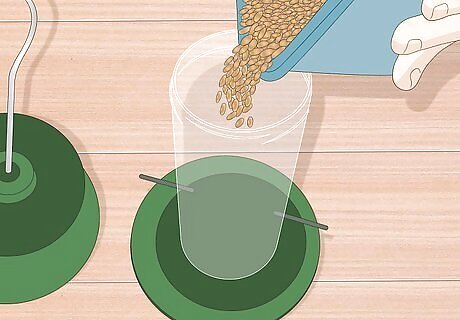
Provide food, such as safflower, that blackbirds don't like. Stock your feeder with Safflower seeds and you won't have to worry about blackbirds raiding your feeder. The seeds have have thick, hard shells that blackbirds have a hard time opening. Since they're a lot of work, they usually just leave them alone. Leave the cheap, generic seed mixes out of your feeders as well. Chickadees, cardinals, goldfinches, and other pretty songbirds don't really like it, but blackbirds love it. Stick with mixes curated to attract specific species. Watch the blackbirds around your yard to get a sense for what they like to eat. Individual species of blackbirds have different foods they prefer.
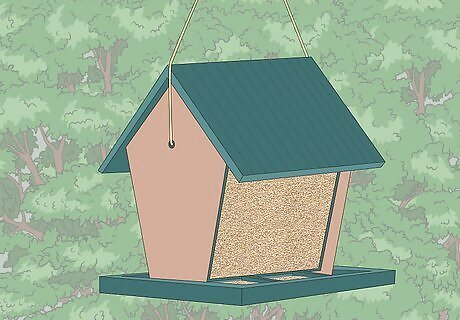
Switch to hopper feeders with weighted perches. If it's in your budget to buy new feeders, you can't go wrong with a hopper feeder. Since the doors close when a larger bird lands on the perch, you don't have to worry about what you're putting in them as much. Do watch for seed spilled on the ground, though, and keep that swept up. As a bonus, hopper feeders also keep other animals, like squirrels and chipmunks, from feasting on the seeds and nuts you leave for the birds.
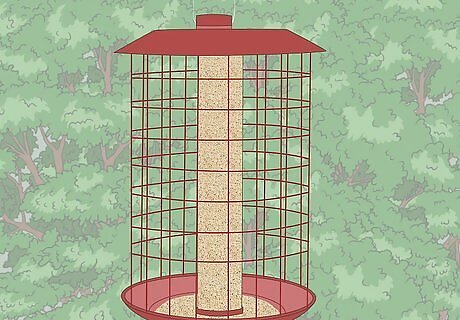
Put a cage or screen around your feeders to block larger birds. Caged bird feeders give smaller songbirds—the ones you want—access to the food while keeping out larger birds. For a DIY option, wrap your feeders in chicken wire—it'll keep blackbirds and other large birds out, but your small songbirds will still be able to reach the feeder. As with the hopper feeders, once the blackbirds figure out they can't get to the food, they'll start looking elsewhere and leave your feeder alone.
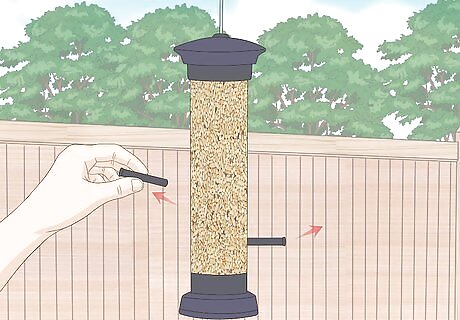
Remove the perches on your feeders. Blackbirds need something to stand on when they feed, but a lot of the tiny songbirds don't. It won't bother the little songbirds if you take off the perches—they never needed them anyway—and the blackbirds won't have a leg (well, perch) to stand on. Some bird feeders have perches you can easily detach so you don't damage them. If yours doesn't, you can always break or saw it off as long as you're confident you won't need it again.
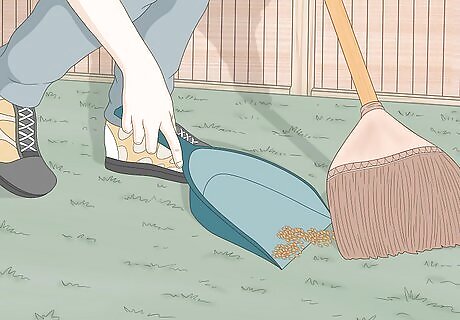
Clean up spilled birdseed daily. Blackbirds are natural foragers and they're really fond of eating their food off the ground. If you have visitors to your bird feeder who tend to leave a mess, that's a buffet for a blackbird—so keep your feeder clean. Just sweep it up and return it to the bird feeder or dump it in a closed trashcan if it's soiled. You could also get a tray to fit under your bird feeder that catches spilled seed. If the seed never reaches the ground, the blackbirds typically won't pay it any attention.
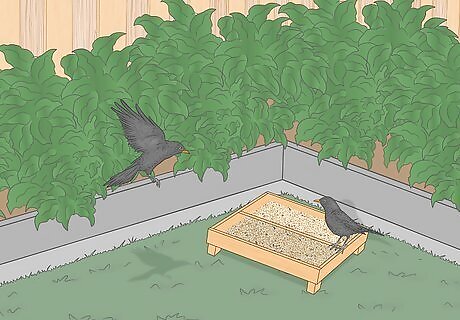
Set up a blackbird feeder in a back corner of your yard. If you've got a little space, choose a faraway corner and set out a tray feeder on the ground with cracked corn, millet, and cheap seed mixes. They'll eat their fill over there and won't disturb your songbird feeders. This is an imperfect solution because the blackbirds will still be around. If you want them to leave your yard entirely, try the other options before you resort to feeding the enemy.
Blocking Blackbird Roosts
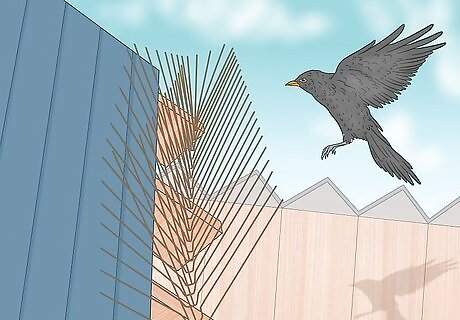
Install bird spikes on ledges where blackbirds roost. Bird spikes designed for large birds will block the blackbirds while still allowing the little songbirds to land and roost safely. This will effectively help you keep birds off of your roof and the tops of fences, where blackbirds like to congregate. Check the product information for the spikes you get—it'll tell you which types of birds the spikes are designed for.
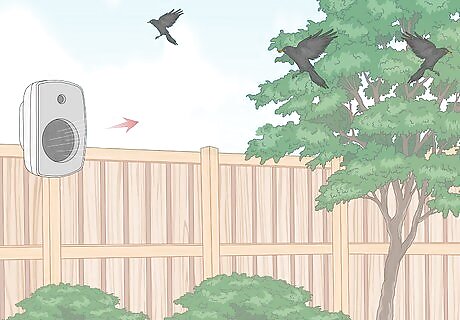
Broadcast alarm calls of blackbirds in the evening. If you notice flocks of blackbirds congregating on your trees as the sun sets, blackbird alarm calls can get them moving. This doesn't require anything fancy—just save a recording of blackbird alarm calls and play it over a wireless speaker. For quality recordings, check YouTube, streaming music services, and ornithology websites. Alarm calls work well to prevent roosting in trees, which blackbirds prefer. Since this can get loud, you probably want to get your neighbors on board. Let them know what you're doing—if they find the birds as annoying as you do, they'll probably be all for it.
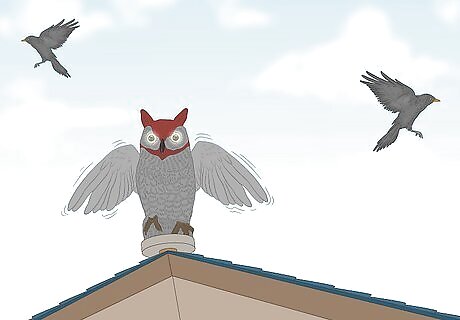
Set up predator decoys to keep the blackbirds on the move. A lifelike, motion-activated owl decoy with lights, motion, and sound might trick the blackbirds into thinking there's a predator in the area—in which case they'll hightail it for safer territory. Blackbirds are pretty smart, though, so don't be shocked if it doesn't work as well as you'd hoped. If the decoy looks like it's working, make sure you move it to a different spot every few days. You've seen the image of the bird sitting on the scarecrow—if the thing never moves, the birds will figure out it's fake. To the extent these decoys work for blackbirds, they tend to work for other bird species as well. Skip the decoys if you're hoping to attract other types of birds, such as songbirds, to your yard.
Protecting Your Yard from Blackbirds
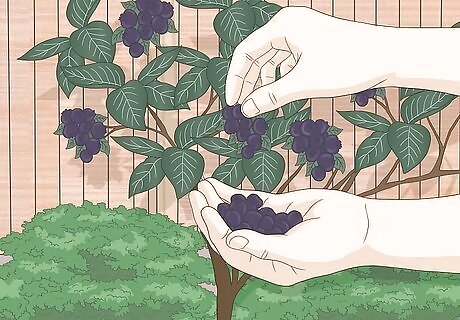
Remove potential wild food sources from your yard. Many types of blackbirds are big fans of fruits and berries and can virtually destroy your plants in the process. Pick fruits and berries as soon as they ripen and prune fruit trees and bushes to take away their temptation. You can also put netting over trees and bushes to protect them.
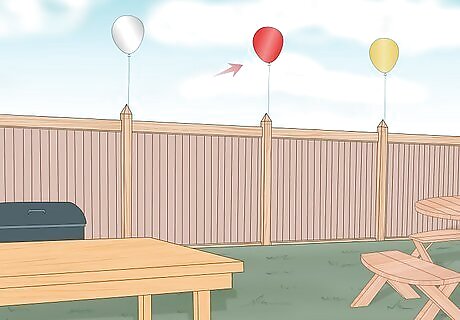
Tie helium-filled balloons around your yard or on buildings. This is a good perimeter defense. Shiny mylar balloons tend to work best because blackbirds are put off by reflective surfaces. Tie them to the corners of a fence or even the top of your bird feeder to keep blackbirds away. The movement of helium balloons in the air is also really unpredictable, so blackbirds tend to stay away from them. While this works for blackbirds and other larger birds, it typically doesn't bother smaller birds, such as songbirds, that fly lower to the ground or are already in your yard.
What's so bad about blackbirds?
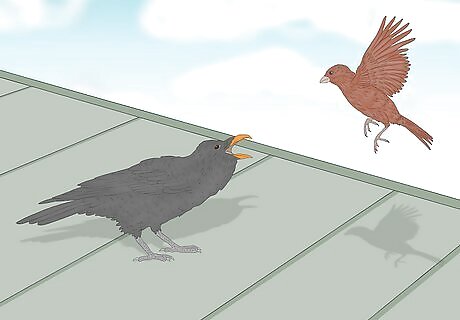
Blackbirds are "bully birds" that tend to harass other birds. They're big birds and they like to push their weight around. If a flock of blackbirds decides to take over your backyard, other birds will tend to stay away. They'll drain your bird feeders daily and start going after other food sources as well, such as flower beds, gardens, and even garbage scraps. Blackbirds feed and roost in large flocks that often number in the hundreds and can even number in the millions! You definitely don't want that descending on your backyard. Once a flock of blackbirds takes a shine to a particular spot, they tend to be pretty territorial about it and will chase off or attack other birds. Because blackbirds roost in such large flocks, the accumulation of droppings and other debris can spread fungal infections to people who live nearby.
Can I try more aggressive measures to get rid of blackbirds?

No, blackbirds are protected by migratory bird laws. International treaties protect migratory birds, so you can't kill them, destroy their eggs, or destroy their nests. Preventive measures that make your property less attractive to them are usually your best bet. If they never develop an affection for your yard, you don't have to worry about trying to get rid of them! These treaties are enforced through national laws, so the specific consequences depend on where you live. But one thing's for sure—messing with migratory birds can get you in big trouble.
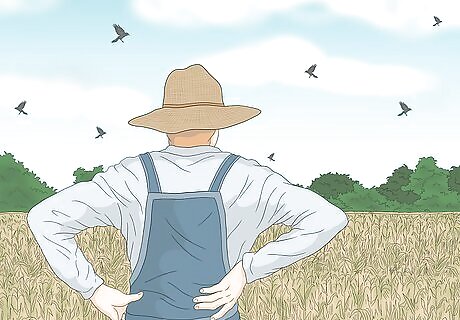
If you're a farmer, you might fall under an exception to the general rule. Some US states do recognize an exception for specific species of blackbirds that are known to cause a nuisance to farms and damage crops. These species include yellow-headed, red-winged, rusty, and Brewer's blackbirds; cowbirds; grackles; crows; and magpies. Contact your local university agricultural extension or USDA wildlife services office, though, before you do anything. A wildlife control expert can assess your situation and help you figure out the best methods that would work for you.




















Comments
0 comment